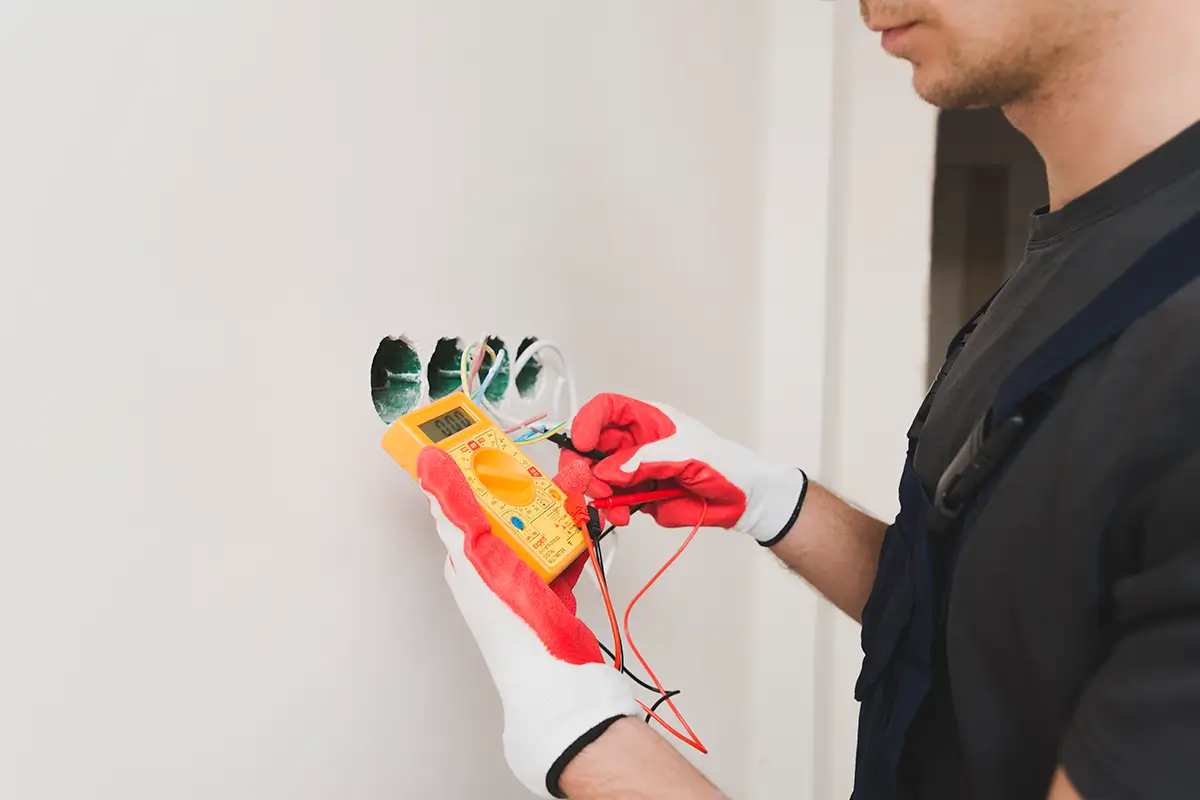Safe and Efficient Electrical Wiring & Rewiring Services in Western New York
At Reimer, we understand the critical importance of safe and efficient electrical wiring for homes and businesses in Western New York. With our extensive experience serving the local community, we are dedicated to ensuring the safety and reliability of electrical systems throughout the region.
Electricity is the lifeblood of modern living, powering our daily activities, appliances, and technology. However, faulty electrical installations and outdated wiring can pose significant risks, including electric shocks and fires.
Ensuring a properly wired and well-maintained electrical system is essential for the safety and well-being of occupants.
With Reimer as your trusted electrical partner, you can be confident that your safety and satisfaction are our top priorities. Our team of highly skilled electricians is equipped to handle all aspects of electrical installations, repairs, inspections, and rewiring.
Let us guide you through the process of achieving a safe, efficient, and reliable electrical system that meets your unique needs in Western New York.
Basics of Electrical Wiring
Components of Electrical Wiring
Electrical wiring systems consist of various components that work together to provide power and lighting throughout a building. Understanding these components is essential for ensuring the safe and efficient functioning of your electrical system.
Wires and Cables:
Wires are the backbone of any electrical system, carrying the flow of electricity from the power source to outlets, switches, and fixtures.
They are typically made of copper or aluminum, with copper being the most common due to its superior conductivity. Copper wires offer low resistance to electrical flow, minimizing energy loss and ensuring efficient power distribution.
Cables are multiple wires grouped together within a protective sheath. They are used for complex electrical connections, such as those found in walls and ceilings.
Common types of cables include non-metallic (NM) cables, which are commonly known as Romex, and armored cables (AC), often referred to as BX.
Outlets, Switches, and Fixtures:
Outlets, switches, and fixtures are crucial components of electrical wiring systems. Outlets, also known as receptacles, provide access to electricity for various devices and appliances.
They come in different configurations, including standard outlets, GFCI (Ground Fault Circuit Interrupter) outlets, and AFCI (Arc Fault Circuit Interrupter) outlets, which offer enhanced safety features.
Switches control the flow of electricity to lighting fixtures and other devices. They allow users to turn lights on and off or adjust the brightness level as needed. Dimmer switches, for example, enable users to set the lighting ambiance in a room.
Fixtures encompass a wide range of lighting sources, from ceiling lights and chandeliers to wall sconces and pendant lights. These fixtures house the light bulbs and are designed to provide illumination and complement the overall aesthetics of a space.
Circuit Breakers and Panels:
Circuit breakers act as safety devices to protect the electrical system from overloads and short circuits. They automatically shut off the power supply when they detect excessive current flow, preventing potential damage to wires and appliances, as well as reducing the risk of electrical fires.
Circuit breakers are housed in electrical panels, also known as breaker boxes, which serve as central distribution points for electricity within a building.
Understanding Electrical Circuits
An electrical circuit is a closed loop through which electricity flows from the power source to various electrical devices and back. It comprises wires, switches, outlets, and fixtures connected in a continuous pathway.
There are two primary types of electrical circuits:
Series Circuits
In a series circuit, the electrical devices are connected in a single pathway. The same current flows through each device, meaning that if one device fails or is disconnected, the entire circuit is interrupted, and all devices lose power. Series circuits are not commonly used in home wiring due to their impracticality for general use.
Parallel Circuits
In a parallel circuit, each electrical device is connected to the power source independently. This configuration allows the current to flow through multiple paths.
If one device fails or is disconnected, the others continue to receive power. Parallel circuits are the standard configuration for home and commercial wiring, as they provide greater flexibility and reliability.
Load Balancing and Preventing Overloading
Load balancing is an essential aspect of electrical wiring design to ensure that electrical circuits distribute power evenly among connected devices.
When electrical devices draw too much power from a circuit, it can lead to overloading, which poses significant safety hazards.
Overloading can cause wires to overheat and potentially start an electrical fire. To prevent overloading, electrical circuits are designed to handle specific amperage, which is the measure of electrical current. The total amperage of all devices connected to a circuit should not exceed the circuit’s capacity.
Professional electricians carefully calculate load requirements for each circuit during the installation process, considering the power needs of all devices that will be connected to it. This load balancing ensures that the electrical system operates safely and efficiently, without the risk of overloading.
Understanding the basics of electrical wiring, including its key components, circuit configurations, and load balancing principles, is essential for maintaining a safe and reliable electrical system.
Properly installed and well-maintained electrical wiring ensures the smooth operation of electrical devices and lighting fixtures, providing comfort and convenience while reducing the risk of electrical hazards in your Western New York property.
Types of Electrical Wiring
Understanding the different types of electrical wiring is crucial for ensuring the safety and efficiency of your property.
In this section, we’ll explore knob and tube wiring, aluminum wiring, and copper wiring commonly found in Western New York.
Knob and Tube Wiring
Knob and tube wiring is an early electrical wiring method that was prevalent in buildings constructed between the late 1800s and the mid-20th century.
It consists of copper conductors mounted on porcelain insulating tubes, which pass through holes drilled in wooden joists and studs. Ceramic knobs support the wires away from the wood to prevent potential hazards.
While knob and tube wiring was considered safe at the time of installation, it is now considered outdated and poses significant safety risks. These risks include the lack of a grounding conductor, limited capacity to handle modern electrical loads, and vulnerability to damage over time due to aging and wear.
Insurance companies and building codes often view properties with knob and tube wiring as high-risk, which may result in higher insurance premiums or difficulties in obtaining coverage.
Aluminum Wiring
Aluminum wiring was commonly used in residential properties during the 1960s and 1970s as a cost-effective alternative to copper wiring.
However, aluminum wiring has been associated with various safety concerns, primarily related to its higher electrical resistance and greater susceptibility to corrosion.
The main issue with aluminum wiring is that it expands and contracts more than copper when subjected to electrical currents, which can lead to loose connections. Loose connections can create a high resistance point that generates heat, increasing the risk of electrical fires.
Homes with aluminum wiring may experience flickering lights, warm switch plates, or sparking at outlets as warning signs of potential problems.
Copper Wiring
Copper wiring is currently the most widely used type of electrical wiring in residential and commercial buildings. It is valued for its excellent electrical conductivity, corrosion resistance, and overall reliability.
Copper wiring is available in two main types:
Solid Copper Wiring: This type of wiring is a single, continuous strand of copper, making it the preferred choice for permanent installations. Solid copper wiring is commonly used in building wiring systems for outlets, switches, and lighting fixtures.
Stranded Copper Wiring: Stranded wiring consists of multiple smaller strands of copper wire twisted together. This construction provides flexibility, making it suitable for applications where bending and movement are required, such as in extension cords.
Identifying Different Wiring in Your Property
Identifying the type of electrical wiring in your property is essential for understanding its safety and potential risks. However, identifying wiring types can be challenging for the average homeowner, as they are often hidden within walls, ceilings, and electrical boxes.
If you are unsure about the wiring in your home or business, it is best to seek the expertise of Reimer’s licensed electricians. A professional electrician can conduct a thorough electrical inspection to determine the type and condition of the wiring in your property.
If your property contains outdated knob and tube wiring or aluminum wiring, it may be necessary to consider rewiring to ensure the safety and efficiency of your electrical system.
Replacing older wiring with modern, code-compliant copper wiring can provide peace of mind and reduce the risk of electrical hazards in your Western New York property.
Signs You Need Electrical Rewiring
Ensuring the safety and functionality of your electrical system is crucial for your home or business in Western New York.
Over time, electrical wiring can deteriorate, become outdated, or experience wear and tear, potentially leading to hazardous situations. Recognizing the signs that indicate the need for electrical rewiring is vital in preventing electrical hazards and maintaining a reliable electrical system.
Here are some common warning signs that warrant immediate attention and potential electrical rewiring:
Flickering or Dimming Lights:
If you notice your lights flickering or dimming regularly, it could be indicative of underlying electrical issues. Flickering lights may occur due to loose wiring connections, faulty light switches, or overloaded circuits.
While a single flicker may not be a significant concern, persistent flickering or dimming can indicate the need for a professional electrician to inspect your electrical system.
Frequent Circuit Breaker Tripping:
Circuit breakers are designed to trip when they detect an electrical overload, preventing potential electrical fires.
Occasional tripping during the use of high-power appliances is normal, but if your circuit breaker trips frequently without an apparent reason, it could suggest an overloaded circuit or faulty wiring.
Ignoring this issue can pose serious safety risks, so it’s crucial to have a qualified electrician from Reimer investigate the problem promptly.
Burning Smell or Sparks:
The presence of a burning smell or sparks around electrical outlets, switches, or appliances is a severe warning sign of electrical problems.
These signs may indicate loose connections, exposed wires, or overloaded circuits. Sparks can quickly escalate into electrical fires, making it imperative to turn off the power source immediately and contact Reimer for an emergency inspection.
Warm Switches or Outlets:
When using electrical switches or outlets, they should not feel warm to the touch. Warmth in these components can indicate faulty wiring, which may lead to electrical hazards or fire risks.
If you notice any switches, outlets, or wall plates becoming unusually warm, it’s essential to have an electrician assess the situation and address the underlying cause.
Outdated Wiring Materials:
Properties with knob and tube or aluminum wiring are at higher risk of electrical issues due to the outdated nature of these materials.
Knob and tube wiring, commonly found in older homes, is not designed to handle the electrical demands of modern appliances and electronics. Likewise, aluminum wiring, prevalent in some properties built between the 1960s and 1970s, can be prone to overheating and pose a fire hazard.
If your property contains these outdated wiring types, it may be time to consider electrical rewiring for improved safety and efficiency.
Frequently Malfunctioning Electrical Appliances:
If your electrical appliances are frequently malfunctioning, such as lights flickering when you turn on certain appliances or devices, it may indicate inadequate or faulty wiring.
Faulty wiring can disrupt the electrical flow to appliances and electronics, causing them to work improperly or wear out faster. Addressing the wiring issue can not only improve the performance of your appliances but also prevent potential damage or electrical hazards.
Paying attention to these warning signs can help you identify potential electrical issues and take proactive measures to ensure the safety and reliability of your electrical system.
Electrical rewiring, when conducted by a licensed and experienced electrician, can mitigate these risks, providing you with peace of mind and a safe electrical environment for your Western New York property.
At Reimer, our team of skilled electricians is equipped to assess your electrical system thoroughly and provide the necessary rewiring solutions to keep your home or business safe and functional. Don’t compromise on electrical safety—contact Reimer today for professional electrical rewiring services.
The Benefits of Rewiring Your Western New York Home or Business
Electrical rewiring is an investment that offers numerous advantages for both homeowners and businesses in Western New York. From improved safety to increased property value, rewiring your property can enhance its overall functionality and efficiency.
Here are some of the key benefits of opting for electrical rewiring:
Improved Electrical Safety
One of the primary reasons to consider electrical rewiring is to enhance the safety of your property. Outdated or faulty wiring can lead to electrical hazards, such as electric shocks and fires. By rewiring your home or business, you can ensure that the electrical system meets current safety standards and regulations.
New wiring, along with modern safety features like ground fault circuit interrupters (GFCIs) and arc fault circuit interrupters (AFCIs), can significantly reduce the risk of electrical accidents, providing you with a safer living and working environment.
Enhanced Energy Efficiency
Upgrading your electrical system through rewiring can lead to improved energy efficiency. Older wiring and electrical components may be less energy-efficient, resulting in unnecessary energy wastage and higher utility bills.
Newer wiring materials and energy-efficient electrical fixtures can optimize power usage, reducing energy consumption and lowering your electricity costs.
In the long run, rewiring can contribute to a more sustainable environment while saving you money on utility expenses.
Increased Property Value
Electrical rewiring can add value to your property, making it a wise investment for homeowners and businesses. When potential buyers or tenants know that the property has updated and safe electrical systems, they are more likely to perceive it as well-maintained and reliable.
Moreover, modern electrical features and energy efficiency can be attractive selling points for prospective buyers, making your property stand out in the real estate market.
Accommodating Modern Electrical Needs
With the advancement of technology, modern homes and businesses require more electrical capacity to support a growing number of electronic devices and appliances. Older electrical systems may struggle to meet these increasing demands, leading to overloaded circuits and frequent tripping of circuit breakers.
Electrical rewiring allows you to accommodate modern electrical needs by installing adequate outlets and circuits to handle your devices and appliances efficiently.
Reducing the Risk of Electrical Fires
Electrical fires are a significant concern in properties with outdated or faulty wiring. Overheating, short circuits, and electrical arcing can lead to potentially catastrophic fires. By rewiring your property, you eliminate the risks associated with aging wiring and ensure that the electrical system operates safely and reliably.
This proactive approach to electrical safety can provide invaluable peace of mind, knowing that your property is protected from the devastating consequences of electrical fires.
Electrical rewiring offers a host of benefits that contribute to the safety, efficiency, and value of your home or business in Western New York.
Whether you’re looking to improve electrical safety, reduce energy consumption, or prepare your property for the demands of modern technology, rewiring is a valuable investment.
To ensure a successful rewiring project, it’s essential to rely on the expertise of a reputable electrical services provider like Reimer.
Our team of skilled electricians is committed to delivering top-notch rewiring services that meet your unique needs and exceed your expectations. Experience the advantages of rewiring—contact Reimer today for professional electrical solutions in Western New York.
Electrical Rewiring Process
Initial Electrical Inspection
The electrical rewiring process begins with an initial inspection conducted by a licensed electrician from Reimer. This inspection is crucial for evaluating the current state of the electrical system, identifying any safety hazards, and determining the scope of the rewiring project.
The electrician will carefully assess the existing wiring, electrical panels, outlets, switches, and fixtures to pinpoint areas that require replacement or upgrades.
Planning and Assessing Wiring Requirements
After the inspection, our expert electricians will collaborate with you to plan the rewiring project. We take into account your specific electrical needs and preferences, including the number of circuits required, the placement of outlets, and the installation of modern electrical features.
The planning phase ensures that the rewiring aligns with your property’s layout and meets the electrical demands of your home or business.
Obtaining Necessary Permits
Electrical rewiring projects in Western New York require permits from the local authorities to ensure compliance with building codes and safety regulations.
As a reputable electrical services provider, Reimer handles all the necessary paperwork and obtains the required permits on your behalf. Our electricians are well-versed in local codes, and we ensure that your rewiring project adheres to all legal requirements.
Disconnecting Power and Removing Old Wiring
Before starting the rewiring work, our electricians will disconnect the power supply to ensure the safety of everyone involved in the project.
Once the power is turned off, the old and outdated wiring is carefully removed from your property. We take meticulous care during this phase to avoid damage to existing structures and ensure a smooth transition to the new electrical system.
Installing New Wiring and Components
With the old wiring removed, our electricians proceed to install the new electrical wiring. We use high-quality wires and cables to ensure durability and long-term performance.
During this phase, we also replace outdated electrical components with modern fixtures, outlets, switches, and electrical panels that meet current safety and efficiency standards.
Proper Grounding and Safety Measures
Proper grounding is a critical aspect of electrical rewiring. Our skilled electricians ensure that all electrical components are correctly grounded to prevent electrical shocks and reduce the risk of electrical fires.
Additionally, we implement various safety measures, such as installing GFCIs and AFCIs, to further enhance the safety of your electrical system.
Final Inspection and Testing:
Once the rewiring is completed, our electricians conduct a comprehensive final inspection and testing of the electrical system. This step ensures that everything is functioning correctly and safely.
We check for any potential issues and make necessary adjustments to guarantee optimal performance. Only after successfully passing the final inspection do we consider the rewiring project complete.
At Reimer, we take pride in our meticulous approach to the electrical rewiring process. Our goal is to deliver exceptional results, ensuring that your property’s electrical system is safe, efficient, and compliant with all regulations.
Call Reimer Today for All Your Wiring and Rewiring Needs in Western New York
For safe, efficient, and reliable electrical solutions in Western New York, trust Reimer.
With years of experience, our expert electricians are equipped to handle all your wiring and rewiring needs. Schedule a consultation today at (716) 272-2371 or fill out our online booking form.
For emergencies, we offer 24/7 electrical services to ensure your safety and satisfaction. Choose Reimer as your trusted electrical partner, and experience the difference of top-notch service and exceptional results.
Let us transform your property with expert electrical solutions that stand the test of time.





